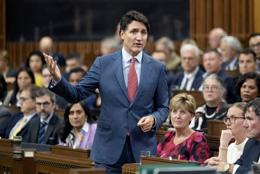Trudeau’s immigration cuts condemned across Canada

By Mata Press Service
Canada’s decision to drastically cut immigration has unleashed a wave of frustration and concern from every corner of the country, with critics warning it could unravel decades of progress.
Opponents argue that scaling back immigration at a time when industries—from tech to healthcare to hospitality —are starving for talent is not just short-sighted; it’s a threat to Canada’s economic resilience and global identity as a bastion of diversity and inclusion.
Prime Minister Justin Trudeau, in announcing the immediate reduction of the government's annual intake of permanent residents, international students, and foreign workers, said his government "didn't get the balance quite right" in trying to address labor needs and maintain population growth.
The new policy shift will see Canada reduce its annual intake of permanent residents immediately by 21 percent to 395,000 next year, 380,000 in 2026, and 365,000 in 2027.
Canada’s temporary population including international students, foreign workers and refugees will also be reduced by 445,901 in 2025, 445,662 in 2026.
Canada had planned to bring in 500,000 next year and the same amount in 2027.
The country’s population has grown in recent years, reaching 41 million in April 2024. Immigration accounted for almost 98% of this growth in 2023, 60% of which can be attributed to temporary residents.
The opposition Conservative Party has lambasted Trudeau and his Liberal Party over the cuts, with Conservative leader Pierre Poilievre describing it as "a massive admission of failure."
Poilievre accused Trudeau of 'ruining the world’s best immigration system,' even as studies reveal that a growing number of Canadians believe immigration levels are too high. This signals a significant shift in perspective for a country traditionally known for its welcoming stance toward newcomers.
The Canadian Chamber of Commerce, which represents over 200,000 businesses across the country, said immigration is a key driver of economic growth and the nation’s only source of workforce growth.
“Significantly decreasing our labour pool will impact thousands of these employers across Canada struggling to find the workforce they need to operate and grow. The changes will also reduce Canada’s capacity to attract foreign direct investment,” the Chamber said.
In a public statement, the Canadian Council for Refugees (CCR) criticized the government, declaring, “In a shameful abdication of responsibility, the Canadian government has massively reduced its commitment to offer protection to those fleeing persecution and danger in the world, and all but ensured that refugees in Canada will remain separated from their spouses and children for years to come.
Calling on the government to reverse “this dangerous course”, CCR President Diana Gallego said; “Canada has betrayed the world’s refugees.”
Separately, a coalition of over 100 community groups voiced their disappointment in an open letter issued, denouncing the cuts to both temporary and permanent immigration. “This government was elected on [a] pro-immigration platform and promised permanent resident status for migrant workers, students and undocumented people at the start of the current mandate,” the letter stated. “Not delivering on them will be remembered at the ballot box.”
Kelly Higginson, President & CEO of Restaurants Canada said the cuts to immigration levels will inevitably impact the quality and cost of the day-to-day lives of Canadians and lead to more business closures in the months to come.
There are currently 78,000 vacant jobs across Canada’s restaurant and food service industry, which is the fourth largest employer nationally, representing 1.2 million workers.
The rush to make massive changes to Canada's immigration levels has many small business owners' heads spinning, said the Canadian Federation of Independent Business (CFIB) – an association of small and medium-sized businesses with 97,000 members across the country.
“CFIB is already receiving panicked calls from small business owners, including many who are heartbroken to have to say goodbye to their foreign workers who are already in Canada and whose visas are soon to expire,” said Dan Kelly, CFIB’s president.
The Canadian Immigration Lawyers Association (CILA) has also condemned the immigration levels reduction by the Trudeau Liberals saying it will create significant economic, fiscal, and social damage to the country.
“Canada’s fundamental need for immigration has not changed” said Barbara Jo Caruso, Co-President of CILA.
“We still have an aging population, low birth rate, and pressing economic and fiscal pressures, hence it is unwise to cut immigration at a time when newcomers are actually part of the solution to enhancing Canada’s living standards.”
Recent changes to Canadian immigration policies, especially regarding the Post-Graduation Work Permit (PGWP), have also had a noticeable impact on international student enrollment patterns.
The PGWP is a key attraction for students globally, as it offers a pathway to gain Canadian work experience and is often a stepping stone toward permanent residency.
Starting next month, international students aiming to apply for the Post-Graduation Work Permit (PGWP) will face new eligibility requirements that limit the range of qualifying programs. The PGWP is essential for students who wish to gain Canadian work experience after completing their studies. Under the updated rules, only graduates from certain approved programs will be eligible for the work permit.
The list of 966 approved programs spans key sectors in need of skilled workers, with categories including agriculture and agri-food, healthcare, science, technology, engineering, and mathematics (STEM), trade, and transport. – with agencies









